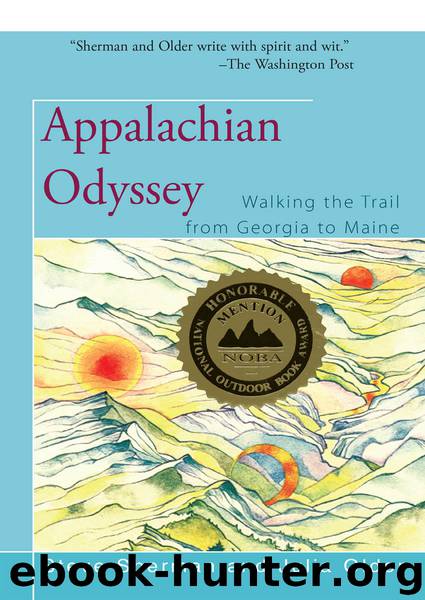Appalachian Odyssey by Steve Sherman

Author:Steve Sherman
Language: eng
Format: epub
ISBN: 9781504030601
Publisher: Open Road Distribution
Published: 2016-05-05T04:00:00+00:00
New Jersey
61 MILES
In frontier America, the crossing of a major river was a major event, a landmark of accomplishment as well as an entrance to new territory and adventures. So it was with us when on July 6 we crossed the Delaware River, though the steel and concrete bridge made the event less than arduous. Swamp grass on the islands in the river was pressed flat against the ground as though it had been brushed with hair cream, the result of a twenty-eight-foot flood that had hit the region days earlier. Although it was midsummer, with the air and sun growing hotter each day, the grass would take days before drying out and returning to its upright stand and resiliency.
Behind us we left Fred Waring and his Pennsylvanians rehearsing in their workshop in the small town of Delaware Water Gap, and entered the Gap itself, a dramatic ravine chiseled out by the Delaware River. In 1965 Congress authorized the Delaware Water Gap National Recreation Area, a long narrow preserve that will eventually include seventy thousand acres of the river boundary between Pennsylvania and New Jersey.
Crossing into our eighth state, we anticipated a smoke-belching, industrialized New Jersey. The logistics of routing the Trail through this tri-state metropolitan sprawl seemed impossible. Anyone who has driven the New Jersey Turnpike past the sulphurous haze of Newark and the chemical quagmires of Secaucus must be struck with the carelessness of man. New Jersey conjures images of exhaust fumes, noisome oil fields, and littered highways.
We were mistaken. As we walked up into the Kittatinny Mountains of upper New Jersey, we realized this was a different song, and not a protest tune at all.
We were accompanied by Ranger Roy Miller, courteous, knowledgeable, handsome, and strong, a Mark Trail of the real woods. Roy was making his rounds, 4½ miles to Sunfish Pond. “Sometimes I feel this territory is all mine,” he said. “I want to keep it in shape. It’s like people are walking and camping on my land. You know what I mean?” We did, for we had often felt the same way about the entire Appalachian Trail. It was our Trail, and we wanted the best for it.
“Now take that over there,” Roy said, and pointed to a charcoal-stained site on the other side of a creek. “That’s a restricted area. No one’s supposed to camp there anymore because when they do they always leave it messier than when they first come. We’ll be coming to Sunfish Pond up ahead. It’s a glacial lake and we want to preserve its unique beauty. So we don’t allow swimming or camping there.”
“Too bad that’s the only way to preserve it.”
“We allowed camping one summer, and the pond turned into a disaster area,” Roy said. “We stressed sanitation and proper waste disposal, but the place was a mess. Beer cans, mildewed sleeping bags, ripped-up tents. The pollution count was incredibly high and a serious health problem for people using the lake for drinking water.”
“What about Trail hikers?” we asked, wondering where we’d sleep that night.
Download
This site does not store any files on its server. We only index and link to content provided by other sites. Please contact the content providers to delete copyright contents if any and email us, we'll remove relevant links or contents immediately.
In a Sunburned Country by Bill Bryson(3526)
Annapurna by Maurice Herzog(3460)
How to Read Nature by Tristan Gooley(3322)
Dangerous Girls by Haas Abigail(3021)
SAS Survival Handbook by John 'Lofty' Wiseman(2712)
The Lost Art of Reading Nature's Signs by Tristan Gooley(2673)
In the Woods by Tana French(2579)
The Stranger in the Woods by Michael Finkel(2513)
Food and Water in an Emergency by Food & Water In An Emergency(2388)
Guns, Germs and Steel by Diamond Jared(2357)
Everest the Cruel Way by Joe Tasker(2327)
Wild: From Lost to Found on the Pacific Crest Trail by Cheryl Strayed(2248)
Backpacker the Complete Guide to Backpacking by Backpacker Magazine(2238)
Sea Survival Handbook by Keith Colwell(2235)
Trail Magic by Trevelyan Quest Edwards & Hazel Edwards(2173)
Ultimate Navigation Manual by Lyle Brotherton(2159)
Welcome to the Goddamn Ice Cube by Blair Braverman(2036)
Birds of the Pacific Northwest by Shewey John; Blount Tim;(1960)
The Last Flight by Julie Clark(1946)
